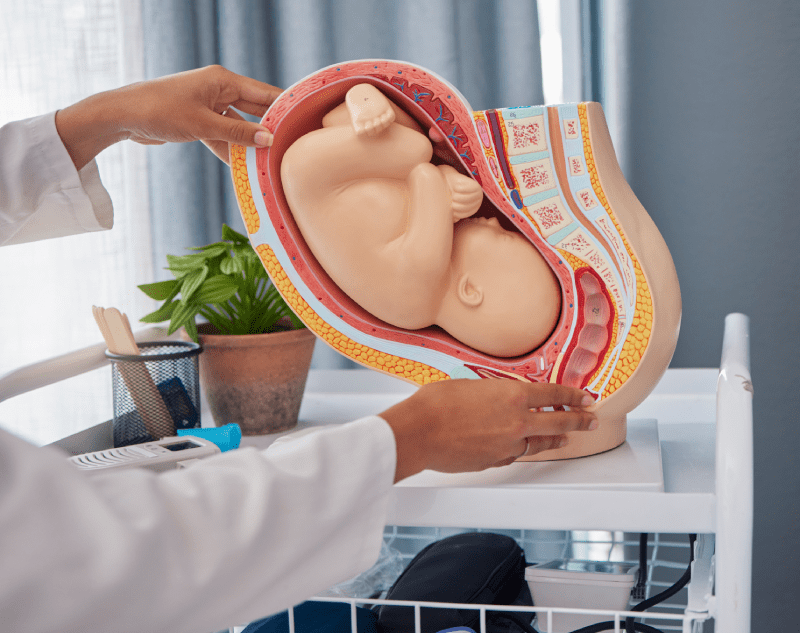How Much IVF and Gender Selection Cost in Thailand?
IVF treatment in Thailand can be an excellent option for couples struggling with infertility. With its combination of affordability, high-quality medical care and hospitable culture, Thailand has become a popular destination for IVF treatment. If you are considering IVF in Thailand, you should continue reading our content.
What is IVF Treatment? When is IVF Treatment Preferred?
In vitro fertilization (IVF) is a medical procedure that helps couples who struggle with infertility to conceive a child. It is a process that involves fertilizing an egg with sperm outside the body and then implanting the fertilized egg into the woman’s uterus. IVF has been around for more than 40 years and has helped millions of people become parents.
The IVF process involves several steps. First, the woman takes medication to stimulate the ovaries to produce multiple eggs. The eggs are then retrieved through a minor surgical procedure and combined with sperm in a laboratory dish. The fertilized eggs (embryos) are then monitored for a few days to ensure they develop properly. Finally, one or more embryos are transferred into the woman’s uterus, where they may implant and develop into a pregnancy.
IVF can be an effective treatment for a wide range of infertility issues, including:
- Blocked or damaged fallopian tubes
- Low sperm count or poor sperm motility
- Endometriosis
- Unexplained infertility
- Age-related infertility
IVF can also be used in cases where a woman has a genetic condition that she does not want to pass on to her child. In these cases, the embryos can be tested before implantation to ensure they do not carry the genetic condition.
In conclusion, IVF is a medical procedure that helps couples struggling with infertility to conceive a child. It involves fertilizing an egg with sperm outside the body and then implanting the fertilized egg into the woman’s uterus. While IVF can be an effective treatment for infertility, it is not always successful, and the success rates depend on several factors. If you are considering IVF, it is important to discuss the risks and benefits with your doctor and choose a reputable IVF clinic.

IVF Treatment Process – How Long Does IVF Treatment Take?
In vitro fertilization (IVF) is a medical procedure that assists couples who are struggling with infertility to conceive a child. IVF has been around for more than 40 years and has helped millions of people become parents. The IVF process involves several steps, and it is important to understand what happens during each stage.
Step 1: Ovarian Stimulation
The first step in the IVF process is ovarian stimulation. The woman takes medication to stimulate the ovaries to produce multiple eggs. This medication may be taken in the form of injections or oral medication. The goal is to produce as many mature eggs as possible, which will be retrieved in the next step of the process.
Step 2: Egg Retrieval
Once the eggs have matured, they are retrieved from the woman’s ovaries through a minor surgical procedure. The procedure is usually performed under sedation or anesthesia, and a small needle is used to extract the eggs from the ovaries. The eggs are then taken to the laboratory for fertilization.
Step 3: Fertilization
The retrieved eggs are combined with sperm in a laboratory dish. Depending on the fertility issues of the couple, there are several options for fertilization:
- Traditional IVF: The sperm and eggs are placed in a dish together, and the sperm fertilizes the eggs naturally.
- Intracytoplasmic sperm injection (ICSI): A single sperm is injected directly into each egg to fertilize it. This technique is used when the sperm quality is poor or if there are other factors that make fertilization difficult.
- Assisted hatching: This technique involves creating a small opening in the outer layer of the embryo to help it implant in the uterus.
After fertilization, the embryos are monitored for a few days to ensure they develop properly.
Step 4: Embryo Transfer
Once the embryos have developed for a few days, one or more are transferred into the woman’s uterus. This is usually done through a catheter inserted through the cervix. The number of embryos transferred depends on several factors, including the woman’s age, the quality of the embryos, and the couple’s preferences. Multiple embryo transfers can increase the chance of success but also increase the risk of multiple pregnancies.
Step 5: Pregnancy Test
About two weeks after the embryo transfer, a pregnancy test is performed to determine if the procedure was successful. If the test is positive, further monitoring and care will be provided by the IVF clinic or the woman’s obstetrician.
While IVF can be a successful treatment for infertility, it is not always successful, and the success rates depend on several factors. It is important to discuss the risks and benefits of IVF with your doctor and to choose a reputable IVF clinic. The IVF process can be emotional, stressful, and costly, but it has helped many couples achieve their dream of having a family.

Can You Choose Gender With IVF?
In vitro fertilization (IVF) is a popular assisted reproductive technology used by couples who have difficulty conceiving a child. With IVF, eggs are fertilized with sperm outside of the body and then implanted into the woman’s uterus. One question that often comes up is whether it is possible to choose the gender of the baby through IVF.
The answer is yes, it is possible to choose the gender of a baby through IVF. This is done through a process called preimplantation genetic screening (PGS) or preimplantation genetic diagnosis (PGD). PGS/PGD involves analyzing the DNA of embryos created through IVF to determine their gender and any potential genetic abnormalities.
To perform PGS/PGD, doctors will take a small sample of cells from the embryo and analyze it for genetic markers. This process can also detect any genetic abnormalities that may be present, such as Down syndrome or cystic fibrosis.
Once the gender of the embryo is determined, the couple can then choose which embryos to implant based on their gender preference. For example, if the couple wants a girl, they can choose to implant only female embryos.
Where Is Gender Selection Legal? Is Gender Selection Legal in Thailand?
Where is gender selection legal?
The legality of gender selection varies from country to country. In some countries, it is completely legal and widely available, while in others, it is either heavily regulated or completely banned.
In the United States, gender selection is legal for medical reasons, such as to prevent certain genetic disorders. However, it is generally not legal for non-medical reasons, such as to choose the gender of a child for personal preference.
In Canada, gender selection is not illegal, but it is not widely available. Fertility clinics are not allowed to offer gender selection services except for medical reasons.
In the United Kingdom, gender selection is banned except for medical reasons. However, some couples travel to other countries to undergo gender selection procedures.
Is gender selection legal in Thailand?
Yes, gender selection is legal in Thailand. In fact, Thailand is known for its gender selection services, which are available at a number of fertility clinics throughout the country.
Gender selection in Thailand is regulated by the Ministry of Public Health. The procedure is only allowed for medical reasons, such as to prevent genetic disorders or to avoid passing on sex-linked diseases.
However, some clinics in Thailand offer gender selection for non-medical reasons, such as for family balancing or personal preference. While this practice is technically illegal, it is not heavily enforced, and many couples from around the world travel to Thailand for gender selection services.
In conclusion, gender selection is legal in some countries, including Thailand. However, the legality and availability of the procedure varies widely, and it is important for couples to carefully consider the ethical implications of gender selection before choosing to undergo the procedure.

Why Travel to Thailand for Gender Selection and IVF?
Gender selection and IVF are popular assisted reproductive technologies used by couples who have difficulty conceiving a child or who wish to choose the gender of their child. While these procedures are available in many countries, some couples choose to travel abroad for these services, and Thailand has become a popular destination for gender selection and IVF. In this article, we will explore why couples choose to travel to Thailand for gender selection and IVF.
- Legal and Affordable
One of the primary reasons why couples choose to travel to Thailand for gender selection and IVF is that these procedures are legal and affordable. Unlike many countries where gender selection is illegal or heavily regulated, Thailand has a more relaxed approach to the procedure. While gender selection is technically only allowed for medical reasons, such as to prevent genetic disorders, some clinics in Thailand offer the procedure for non-medical reasons as well.
Additionally, IVF is widely available in Thailand, and the cost of the procedure is significantly lower than in many Western countries. This makes Thailand an attractive option for couples who are seeking affordable fertility treatments.
- Experienced and Qualified Doctors
Thailand is home to many experienced and qualified doctors who specialize in fertility treatments, including gender selection and IVF. Many of these doctors have received training and education abroad, and they use the latest techniques and technologies to ensure the best possible outcomes for their patients.
Additionally, many fertility clinics in Thailand are accredited by international organizations, such as the Joint Commission International (JCI), which ensures that they meet the highest sta
- State-of-the-Art Facilities
Fertility clinics in Thailand offer state-of-the-art facilities and equipment, which are on par with those found in Western countries. These clinics are equipped with the latest technologies and tools to provide the best possible care for their patients.
Additionally, many clinics in Thailand offer a range of services to make the fertility treatment process as smooth and convenient as possible. For example, some clinics offer accommodations for patients and their families, as well as transportation services to and from the clinic.
- Tourism Opportunities
Thailand is a popular tourist destination, and couples who travel there for gender selection and IVF can take advantage of the country’s many attractions and activities. From beautiful beaches to ancient temples, Thailand offers something for everyone. Additionally, the country is known for its world-renowned cuisine, which is a major draw for foodies from around the world.
In conclusion, Thailand has become a popular destination for gender selection and IVF because of its legal and affordable procedures, experienced and qualified doctors, state-of-the-art facilities, and tourism opportunities. Couples who are considering these procedures may want to explore the options available in Thailand and consult with a doctor and a travel agent to plan their trip.
Thailand Fertility Centers
Thailand Fertility Centers = Helping Couples Realize their Dreams of Parenthood
Thailand has become a hub for medical tourism, and fertility treatments are no exception. There are many fertility centers in Thailand that offer high-quality medical care at a fraction of the cost of similar treatments in the West. These centers offer a range of fertility treatments from basic infertility testing to advanced assisted reproductive technology (ART) procedures such as in vitro fertilization (IVF), intracytoplasmic sperm injection (ICSI), and egg donation.
One of the advantages of Thailand fertility centers is that they are staffed by highly trained and experienced medical professionals. Many doctors and nurses at these centers have received their education and training in the West, and are equipped with the latest technology and techniques for fertility treatment. The centers also have a high success rate for fertility treatments, which is a testament to the quality of care they provide.
Another advantage of Thailand fertility centers is that they offer a range of fertility treatments at a much lower cost than similar treatments in the West. This is due to the lower cost of living in Thailand, as well as the government’s support for medical tourism. This makes fertility treatments accessible to couples who may not be able to afford them in their home countries.
In addition, Thailand fertility centers offer a range of services that cater to the needs of couples undergoing fertility treatments. These services include counseling and support groups, which can help couples cope with the emotional and psychological stress of infertility. The centers also offer travel packages that include accommodation and transportation, making it easier for couples to travel to Thailand for treatment.
Thailand fertility centers are also known for their high standards of care and safety. The centers are regulated by the Thai government, and are required to adhere to strict standards for medical care and safety. The centers also have accreditation from international organizations such as the Joint Commission International (JCI), which ensures that they meet the highest standards for medical care.

IVF and Gender Selection Costs in Thailand
In vitro fertilization (IVF) is an assisted reproductive technology that has helped many couples overcome infertility and realize their dream of starting a family. IVF involves fertilizing an egg with sperm in a laboratory and then transferring the resulting embryo to the woman’s uterus. In recent years, IVF has also been used for gender selection, which allows couples to choose the gender of their baby. Thailand is one of the countries where IVF and gender selection services are available at a lower cost compared to other countries. In this article, we will explore the costs of IVF and gender selection in Thailand.
IVF Costs in Thailand
The cost of IVF in Thailand varies depending on the clinic, the complexity of the procedure, and the number of cycles required. On average, the cost of a single cycle of IVF in Thailand ranges from 100,000 to 200,000 Thai Baht (THB), which is approximately $3,000 to $6,000 USD. This is significantly lower than the cost of IVF in Western countries, which can range from $10,000 to $15,000 USD per cycle.
However, it is important to note that the cost of IVF in Thailand may not include additional expenses such as medications, diagnostic tests, and consultations. These additional costs can add up, so it is important to get a clear understanding of the total cost of treatment before starting the process.
Gender Selection Costs in Thailand
Gender selection is a controversial topic, but it is legal in Thailand. Gender selection can be done through IVF using a technique called Preimplantation Genetic Diagnosis (PGD). PGD involves testing the embryos for gender before they are transferred to the woman’s uterus. Couples can choose to transfer only embryos of a specific gender.
The cost of gender selection in Thailand is higher than the cost of IVF alone. The cost of one cycle of IVF with gender selection using PGD in Thailand can range from 200,000 to 300,000 THB, which is approximately $6,000 to $9,000 USD. This cost includes the cost of IVF plus the cost of PGD testing.













